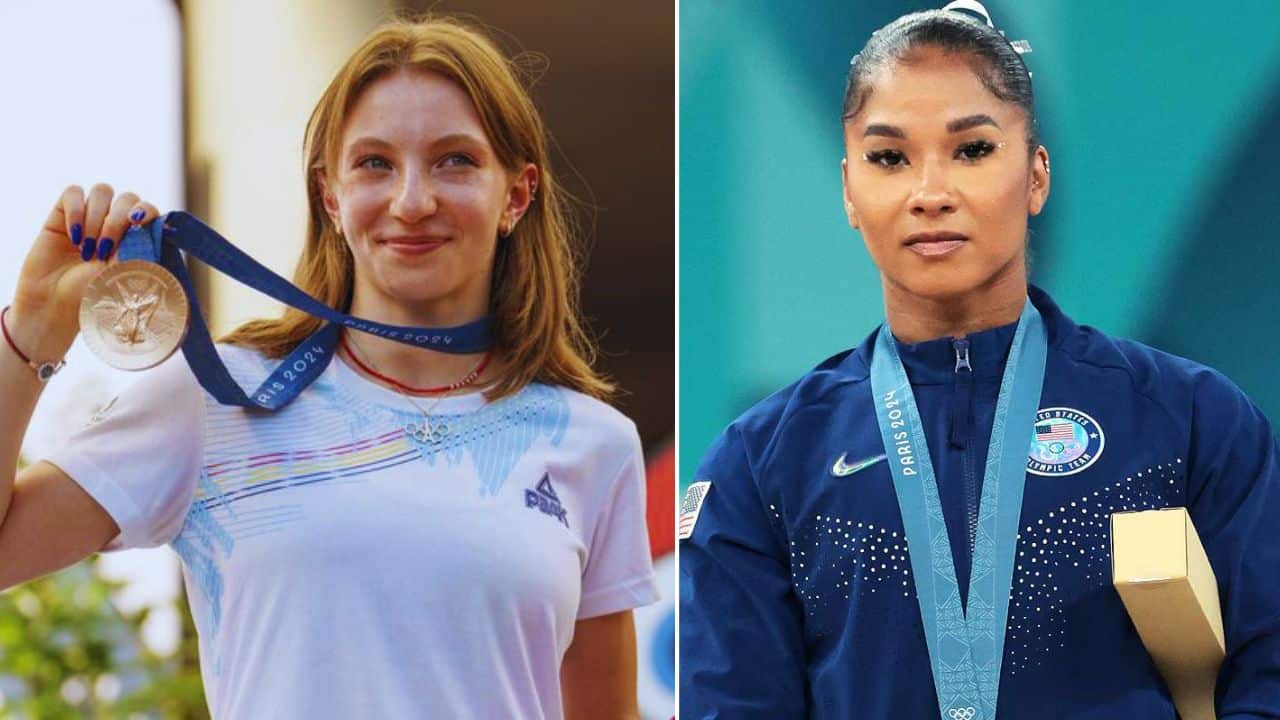Romanian gymnast Ana Bărbosu made headlines during the Olympic bronze medal ceremony for the floor exercise on Friday, as she addressed fellow competitor Jordan Chiles amidst an ongoing scoring controversy. The dispute, which has captivated the gymnastics world, could potentially result in Chiles losing the bronze medal she was initially awarded, a development that has sparked intense debate and scrutiny.
The Ceremony in Bucharest: A Day of Mixed Emotions
The official medal ceremony took place in Bucharest, Romania, just one day after the International Olympic Committee (IOC) gave its approval for the event. The ceremony, held at the prestigious Romanian Olympic and Sports Committee headquarters, was a highly anticipated moment, not just for the athletes involved, but for the entire gymnastics community. The event was attended by a host of dignitaries, including Romanian Prime Minister Marcel Ciolacu, IOC member Octavian Morariu, and Mihai Covaliu, the president of the Romanian Olympic and Sports Committee.
The ceremony was filled with a mix of joy and tension as Bărbosu received her bronze medal in front of an audience that included fans, officials, and fellow athletes. The Romanian gymnast, who has been at the center of the controversy alongside her teammate Sabrina Voinea, took this opportunity to address the ongoing situation directly.
Ana Bărbosu’s Emotional Speech: A Plea for Understanding
In a heartfelt speech delivered in Romanian, Bărbosu expressed her deep emotions and concerns regarding the situation that has unfolded since the Olympic competition. “I can’t help but think about Sabrina and Jordan right now,” Bărbosu began, her voice steady yet filled with emotion. “It’s a difficult situation for us, with so many uncertainties and overwhelming emotions. I hope everyone understands that we have not done anything wrong at the Olympics. And that the Olympic spirit is more important than any misunderstanding between the authorities.”
Bărbosu’s words were a clear plea for understanding and solidarity. She emphasized that the situation was not just about a medal, but about the values that the Olympics represent. “I want to believe that the day will come when all three of us will receive a bronze medal,” she added, reflecting her hope for a resolution that honors the efforts of all the athletes involved.
Her speech resonated with many in the audience, who applauded her for her maturity and sportsmanship. Bărbosu’s remarks also highlighted the emotional toll that such controversies can have on athletes, who dedicate years of their lives to their sport.
The Controversy: How It All Unfolded
The controversy began during the Olympic gymnastics competition when Bărbosu and Voinea both delivered stunning performances in the floor exercise. Their routines were met with high praise, and when the scores were revealed, both Romanian gymnasts had received identical marks. However, according to the rules, in the case of a tie, the execution score serves as the tiebreaker. Bărbosu’s execution score was slightly higher, earning her the bronze medal over her teammate Voinea.
On the other side of the story was American gymnast Jordan Chiles. Chiles initially appeared to have secured the bronze medal in Paris after her coach, Cecile Landi, submitted an inquiry that resulted in an increase in Chiles’ difficulty score. The inquiry, a common practice in gymnastics, was initially accepted, and Chiles was awarded the bronze medal, placing her ahead of the two Romanian gymnasts.
However, the situation took a dramatic turn when the Court of Arbitration for Sport (CAS) reviewed the inquiry. The CAS ruled that the inquiry had been submitted beyond the allowed time limit, citing an alleged time violation. This ruling resulted in the reversal of the inquiry’s effects, dropping Chiles’ overall score and moving her down to fifth place. This decision propelled Bărbosu and Voinea into the bronze and fourth positions, respectively, sparking controversy and debate among fans, officials, and the media.
U.S. Officials Challenge the Decision
The decision by the CAS did not go unchallenged. U.S. officials quickly voiced their objections to the ruling, disputing the alleged time violation that had been cited. According to U.S. gymnastics officials, the inquiry had been submitted within the appropriate time frame, and they argued that the CAS ruling was unjust. The dispute over the timing of the inquiry has since become a focal point of the controversy, with both sides presenting their interpretations of the rules and regulations.
Chiles, who found herself at the center of the controversy, has faced immense pressure and scrutiny. The young gymnast, known for her resilience and determination, has been open about the emotional challenges she has faced as a result of the situation.
Jordan Chiles Breaks Her Silence
In the days following the CAS ruling, Jordan Chiles took to social media to express her thoughts on the situation. In a statement posted on her Instagram account, Chiles shared her frustration and disappointment with the decision, describing it as “unjust.” She also revealed that she had been the target of racially driven attacks online, which added to the emotional burden she was already carrying.
“I will approach this challenge as I have others — and will make every effort to ensure that justice is done,” Chiles wrote in her statement. “I believe that at the end of this journey, the people in control will do the right thing.”
Chiles’ statement was met with an outpouring of support from fans, fellow athletes, and members of the gymnastics community. Many praised her for her courage in speaking out and for her commitment to pursuing justice. Her words also highlighted the broader issues of fairness and equality in sports, particularly in how athletes from different countries and backgrounds are treated.
Ana Bărbosu Receives Her Medal: A Moment of Triumph and Reflection
Back in Bucharest, as Ana Bărbosu received her bronze medal from IOC member Octavian Morariu and Mihai Covaliu, she took a moment to reflect on the journey that had brought her to this point. “I did not realize how heavy it is,” Bărbosu said, holding the medal in her hands. “I am glad to be in possession of this medal and I hope to continue to represent Romania at the highest level.”
For Bărbosu, the medal represented not just a victory on the gymnastics floor, but a triumph over adversity. The young gymnast has been a rising star in Romanian gymnastics, and her performance at the Olympics solidified her status as one of the sport’s most promising talents. However, the controversy surrounding the scoring has also served as a reminder of the challenges that athletes often face, even in moments of success.
The Bigger Picture: What This Controversy Means for Gymnastics
The scoring controversy involving Ana Bărbosu, Sabrina Voinea, and Jordan Chiles has raised important questions about the fairness and transparency of the scoring system in gymnastics. The sport, which relies heavily on subjective judgments by judges, has long been the subject of debates and disputes over scoring decisions. This latest controversy has once again brought these issues to the forefront, prompting calls for reforms and greater accountability in the judging process.
The situation has also highlighted the emotional and psychological impact that such disputes can have on athletes. For Bărbosu, Voinea, and Chiles, the past few weeks have been a rollercoaster of emotions, as they have had to navigate the uncertainty and pressure that come with being at the center of a major controversy.
As the gymnastics community continues to grapple with the fallout from the scoring decision, there is a growing sense that changes may be needed to prevent similar situations from occurring in the future. Whether this will lead to reforms in the scoring system or other changes in the way the sport is governed remains to be seen.
A Call for Unity and Fairness
As Ana Bărbosu, Sabrina Voinea, and Jordan Chiles move forward from this controversy, their stories serve as a powerful reminder of the importance of fairness, transparency, and sportsmanship in the world of gymnastics. The Olympic Games are meant to celebrate the best in athletic achievement, and the athletes who compete at this level deserve to have their performances judged in a manner that is fair and consistent.
Bărbosu’s words at the medal ceremony, where she expressed her hope that all three athletes would one day be recognized with a bronze medal, reflect the spirit of unity and respect that should be at the heart of all sports. As the gymnastics community continues to reflect on this controversy, it is clear that the lessons learned from this experience will shape the future of the sport for years to come.
For now, the world watches as these three athletes continue their journeys, both in and out of the gym, with the hope that the right decisions will be made, and that the true spirit of the Olympics will prevail.


































